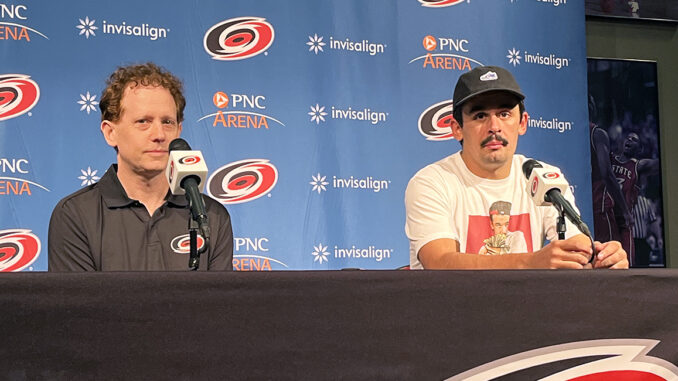
RALEIGH — The Hurricanes and Seth Jarvis both wanted his new contract to lock up the 22-year-old as a cornerstone player for the franchise.
And why not? From Carolina’s perspective, Jarvis, the 13th overall pick in the 2020 NHL Draft, had just come off scoring 33 goals — more than twice the combined total he had in his first two NHL seasons despite playing much of last year with an injured shoulder. His skill and talent are only matched by his effort and determination, which endeared him to coach Rod Brind’Amour.
“Rod asks a lot of our players,” Hurricanes GM Eric Tulsky said at Wednesday’s press conference announcing Jarvis’ new eight-year contract extension. “We demand a lot, and there are not many people who cannot just do everything we ask, but exceed everything we ask. Seth is one of those players, and it’s really great for us to be able to lock him up, have him commit to play with us for the next eight years — hopefully beyond that too.”
And Jarvis wanted to be in Raleigh. His bond with both his teammates and Brind’Amour — who, along with the rest of the coaching staff, helped mold Jarvis into a two-way force who finished eighth in Selke Trophy voting last season — made Carolina an ideal fit now and down the road.
“This is where I wanted to be,” Jarvis said, “and I wanted to try my best to make it work.”
So easy enough, right? Draw it up.
If only any negotiation were that easy. Despite the desire from both sides to get a deal done, they still had to come to terms on the money Jarvis would be due. Estimates had Jarvis’ deal — he was a restricted free agent with no arbitration rights coming off his entry-level contract — coming in at about $8 million annually over eight years.
With Jarvis just entering his prime and the salary cap expected to rapidly rise, that amount seemed fair for both sides. The Hurricanes, however, had to consider the immediate implications of such a high cap number. The goal for Carolina was to have Jarvis’ cap hit come in under the $7.75 million annual average value of Andrei Svechnikov’s eight-year contract, signed in August 2021, which at the time of signing made up 9.51% of the salary cap.
With the 2024-25 season NHL salary cap ceiling at $88 million, 9.51% would be nearly $8.37 million AAV — certainly a number Jarvis could make a case for given that he had established himself as a first-over-the-boards, all-situations player with 64 goals and 146 points in 231 games during his first three NHL seasons. Svechnikov, comparatively, had 59 goals and 140 points in 205 games during his entry-level contract.
Pedigree also factors in during negotiations like this, and the fact that Svechnikov was the second overall pick in 2018 carries some negotiating leverage — thus making the rumored 8X8 deal for Jarvis a good starting point in talks.
But how could Carolina get Jarvis’ cap hit under Svechnikov’s — and keep the team under the $88 million cap ceiling — if he was worth roughly $8 million a year?
Enter deferred money.
Carolina had tinkered with this concept on the eight-year extension signed by Jaccob Slavin this summer. Slavin’s deal will pay him a total of $51.69 million, but according to PuckPedia, it will only cost the team $51.17 million — a modest savings of $520,000, or $65,000 annually — against the cap by deferring some of the money until after Slavin’s contract is over in 2033.
Everyone understands that money in one’s pocket now is more valuable than the same amount of money in one, five or 10 years. Inflation alone, as we’ve all learned the past few years, devalues currency, plus having funds in the present allows one to invest the money so it can earn that future value — and presumably more — over time.
“We started looking at it in probably May or June,” Tulsky said of the idea of using deferred money to lower a player’s cap hit. “Interest rates got high, and so it started to be a useful tool. We brought it up in conversation, and it was a way to get where we wanted on this.”
Let’s piece this together as it pertains to Jarvis. The Hurricanes and Gerry Johansson, Jarvis’ agent, agreed to a contract with a full value of $63.2 million over eight years — $7.9 million annually, just a touch under the $8 million mentioned above.
To lower the cap hit, the two sides agreed to defer $15.67 million in bonuses to the day after the eight-year contract expires. By doing so, Carolina is paying Jarvis what his money will be worth in 2032 — given high interest rates — while applying to its cap the amount that money is worth in the present.
“They really had a tough time breaking down for me. I had no idea what it meant,” joked Jarvis, who said the team came to him two or three weeks before the deal was signed to explain the offer and deferred money.
The savings are significant — Jarvis’ cap hit is lowered from $7.9 million to just over $7.42 million — nearly $500,000 in cap space annually.
In return, Jarvis gets the salary he deserves while also helping the team by creating cap space. He will also have a stack of money waiting for him in 2032.
“It was just something that helped me but also helped the team,” Jarvis said. “And that’s more what we were looking for is being able to build something around not just me but around here, around the team, to be able to have more space to bring in other guys.”
With the Federal Reserve slated to cut interest rates — and probably do it frequently as the economy improves and inflation slows — players will be less likely to accept deferred money because the return won’t be worth their while.
But for Jarvis and the Hurricanes, the stars aligned for both sides to get exactly what they wanted.




